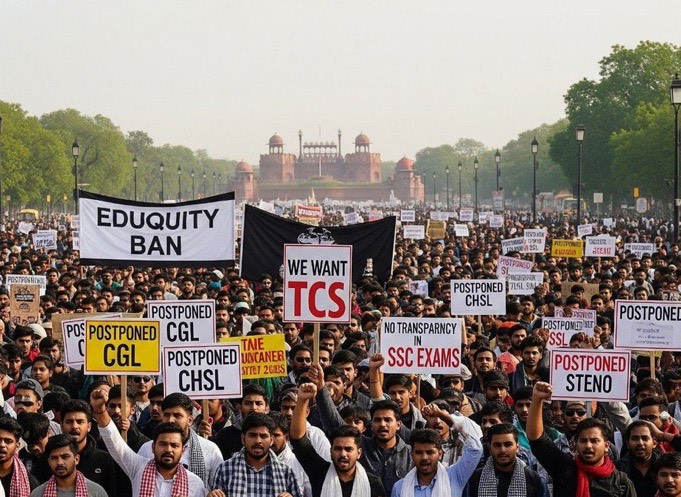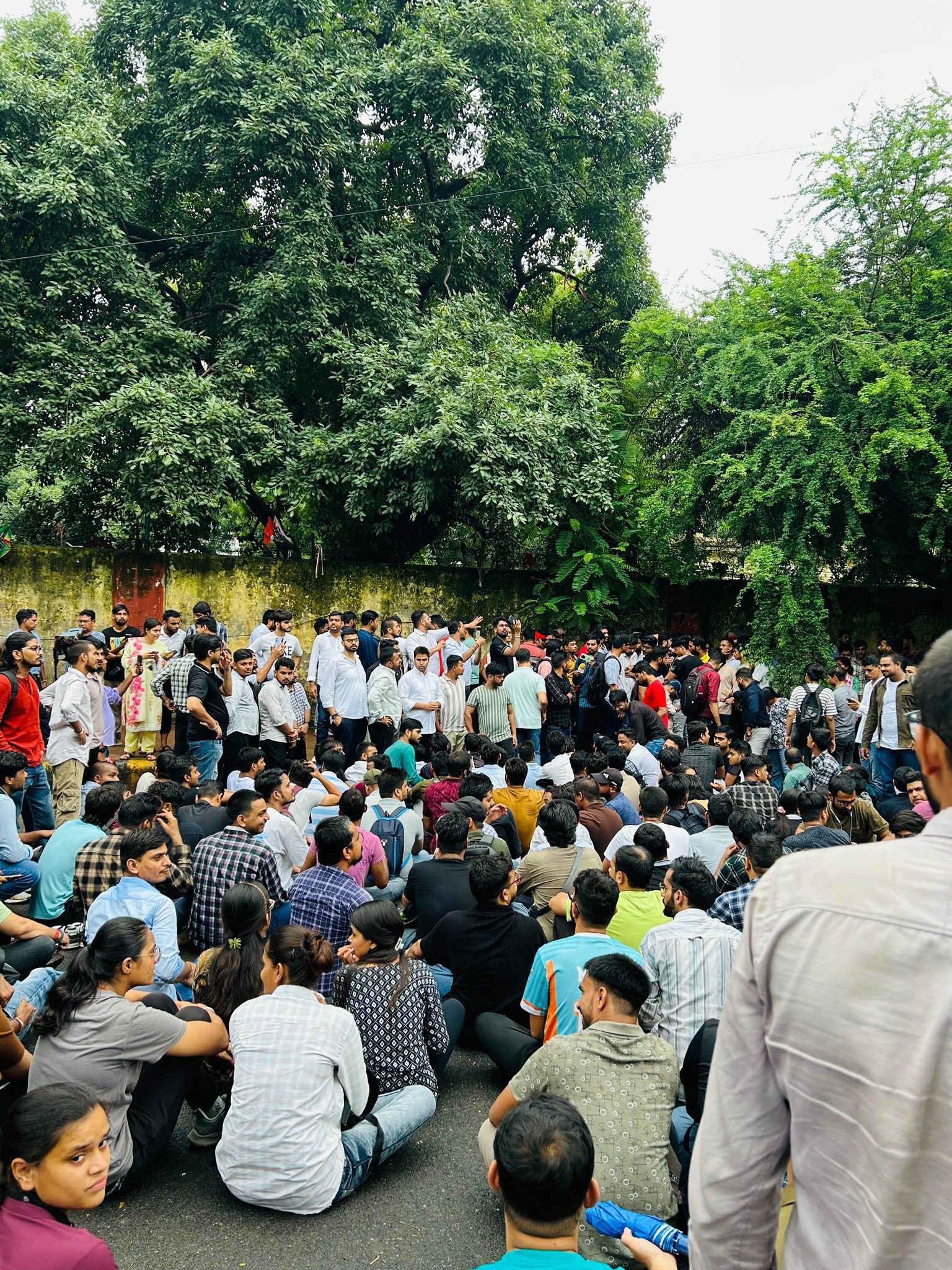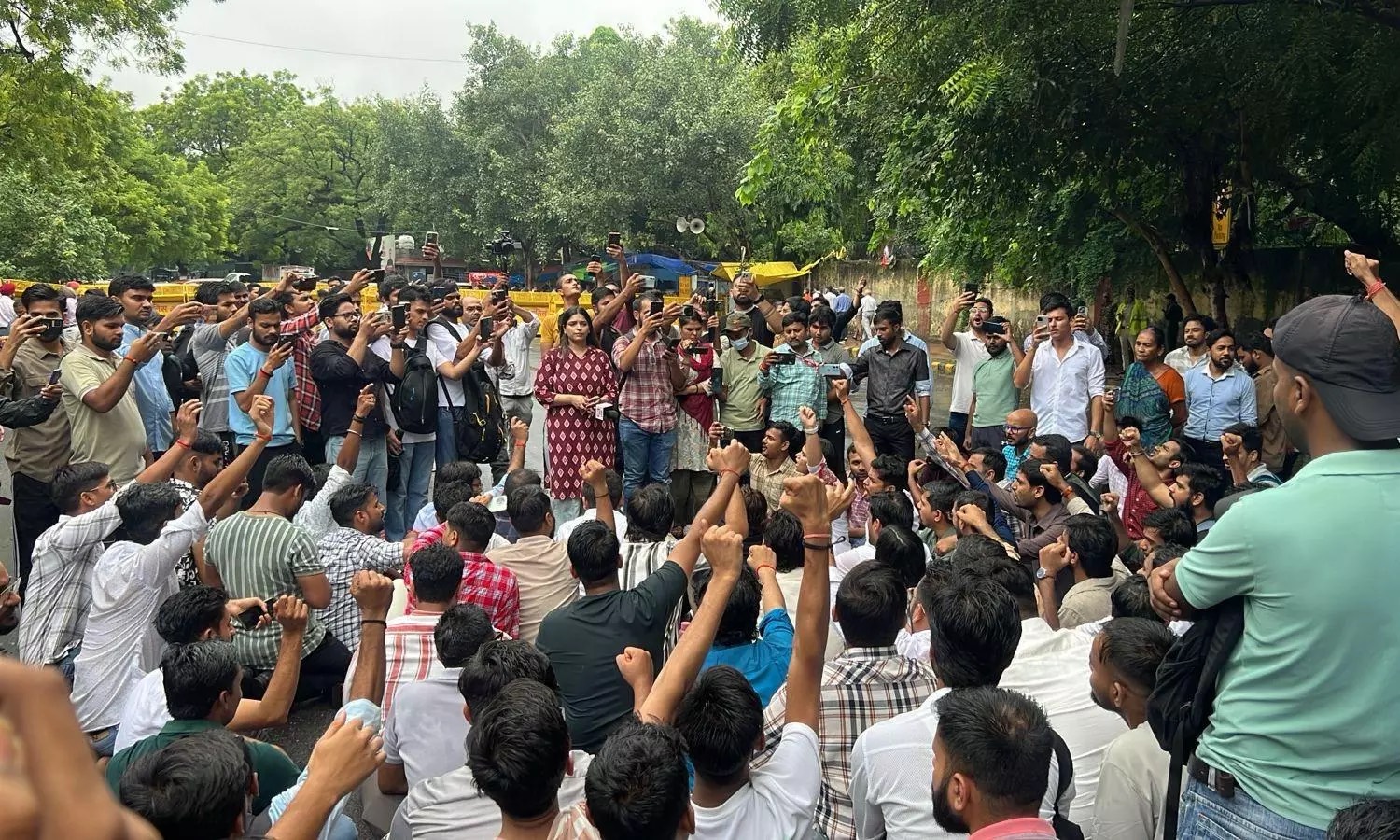Ineligible and Blacklisted Vendor, Technical Chaos: How SSC’s Phase XIII Exam Disaster Derailed CGL 2025, Shattered Student Trust

Unzila Sheikh and Aditya Sharma/TwoCircles.net
New Delhi: For lakhs of students preparing for one of India’s most awaited government job exams, August was meant to mark a new chapter in their journey. The Combined Graduate Level (CGL) Examination 2025 conducted by the Staff Selection Commission (SSC) was scheduled to begin on August 13. Many spent years in preparation. Some studied under candlelight, some worked jobs while studying and others left home to find a better future.
On August 8, the SSC announced the postponement of the CGL 2025 exam to the first week of September. Officials cited “planned and rigorous evaluation” of the online platform and exam readiness as the reason. The new schedule, SSC said, would soon be published on its website.
But this postponement did not come out of nowhere. It followed days of disruptions, anger and confusion surrounding another ongoing SSC recruitment exam, the Selection Post Phase XIII exam, conducted between July 24 and August 1. That exam had turned into a nationwide crisis and sparked outrage, protests and detentions. What was meant to be a straightforward computer-based test (CBT) became a symbol of mismanagement.
Breakdown of a National-Level Exam
The Selection Post Phase XIII exam had problems from the start. Thousands of students across India arrived at their centres on exam day, only to find that the test had been cancelled, delayed or marred by technical issues. Computers stopped working, systems crashed, electricity went out and many could not even log in.
About 55,000 candidates were affected due to mismatches in data and system failures. The SSC later confirmed that these students would be allowed to retake their exam on August 29 and their previous attempts would be considered invalid. Admit cards for the re-exam will be available from August 26.

According to the Commission, these students will be given centres based on their original preferences “on a best-effort basis”. Details will be sent to their registered e-mails and mobile numbers.
Candidates have also been given a chance to correct their One Time Registration (OTR) details between August 14 and 31. Once this window closes, no changes will be allowed. The application process for future SSC exams is set to start in September 2025.
Protests Erupt Across India
The frustration of students quickly spilled onto the streets. Large crowds of aspirants gathered outside the Department of Personnel and Training (DoPT) in Delhi, demanding accountability. Some carried banners, some wept and some shouted slogans. The police responded with detentions after clashes broke out near Jantar Mantar.
Students shared stories of the ordeal they went through. A candidate who had travelled over 400 kilometres said, “We have completely lost faith in the SSC because of their choice of vendor. They gave the contract to a company already declared ineligible by the Central Directorate General of Training. Everything was mismanaged. Centres were far away, staff was untrained and computer systems did not work. Even the mouse was not functioning in some centres. Power cuts kept happening. The stationery was poor. How can we focus on the exam in such conditions?”
Others pointed to the timing of the admit cards. Usually, the SSC releases admit cards at least four days before the exam. This time, many students received them just two days prior. Some were shocked to find themselves allotted to centres in distant places like the Andaman and Nicobar Islands. “How are we supposed to afford the travel? How do we mentally prepare for something like this?” asked one student from Jaipur.
One candidate recalled how her exam was disrupted by a power failure. “Some of us had already finished 10-15 minutes when there was a power outage. We had to start over. But this time, we were only given 70-75 minutes to finish. That is not fair. Add to this the mouse issues, server crashes and poor-quality paper. All these really affected how we performed,” he said.
Across several centres, invigilators and staff struggled to handle the situation. Many did not have the technical knowledge to resolve issues, and some students even reported rude behaviour and harassment.

Aadhaar-based biometric verification also created problems. In some cases, applicants could not submit their forms due to mismatches. Many students reported that the verification failed at the exam centre, leading to disqualification on the spot.
The Eduquity Controversy
The name at the centre of this crisis is Eduquity Career Technologies, the agency hired by the SSC to conduct the Phase XIII exam. Their selection led to immediate backlash.
Students alleged that Eduquity had a long record of exam-related failures. In 2020, it was declared ineligible by the Central Directorate General of Training. In 2022, it was accused of outsourcing the Madhya Pradesh Teacher Eligibility Test to another company that resulted in a paper leak. Similar problems were reported in Patwari exams in Madhya Pradesh and MBA entrance tests in Maharashtra.
“Eduquity is already a blacklisted company. The MP High Court has said they should not conduct exams, but they still continue to get contracts. For me, this exam is everything, my life depends on it. We only want Eduquity removed,” said the aspirant.
SSC Chairman S. Gopalakrishnan responded to the controversy. He denied that a blacklisted vendor was chosen. “This agency is new to SSC exams. Some problems are expected in the beginning. Large centres are not available everywhere, so some students had to travel far,” he said.
He acknowledged that exams were cancelled in two locations due to security reasons but said they were reconducted on the same day. Removing the vendor now, he warned, would delay future exams until at least December.
The Commission’s Response
Despite the backlash, the SSC has decided not to cancel the Phase XIII exam. Instead, it will hold a re-exam for students who were denied a “fair chance”. The Commission has contacted Eduquity regarding the complaints. “If we find even one candidate who was wronged, we will re-conduct the exam for them,” said the chairman.
The Phase XIII test was held across 194 centres in 142 cities, with close to 5 lakh candidates appearing. On August 2, supplementary tests were conducted in three shifts for 16,600 candidates. Only 8,048 attended. In two centres (one in Delhi and other in Uttar Pradesh), the exam was cancelled, affecting 2,500 students.
Yawar Abbas, a candidate who appeared for Phase XIII, said, “My centre was nearly 500 kilometres away. The question paper had repeated questions from July 24 and 25. One question even asked, ‘Who sang DJ Wale Babu?’ The TCS was not perfect, but at least their papers were of good quality and centre allocation made sense.”
Gopalakrishnan accepted that there were “teething problems” with the new vendor and promised penalties for issues like system crashes and mouse malfunctions. He said the SSC uses CCTV, electronic logs and CDAC monitoring to maintain exam integrity. Officials clarified that artificial intelligence is used to avoid repeating questions, though students reported seeing the same ones multiple times.
This SSC controversy fits into a growing pattern of exam failures in India. In March, the Railway Recruitment Board (RRB) had to cancel an exam for assistant locomotive pilots due to wrongly loaded question papers.
The national medical entrance exam, NEET, has seen technical problems for three years in a row. The Delhi High Court has asked the National Testing Agency (NTA) to create a grievance system for affected students.
More Voices
As the CGL 2025 exam approaches, demands from students continue to rise. They want Eduquity removed from future exams. They are asking for reimbursement of travel and lodging costs. They demand that admit cards be released on time and centres allocated more sensibly. They want officials to be held accountable for failures.
It is not just CGL and Phase XIII candidates who are upset. Students who appeared for the SSC stenography exam on August 6, 7 and 8 also reported serious issues.
“Our paper had questions from outside the syllabus, like maths, which is not part of steno exams. The reasoning section was also out of syllabus. Some questions had the wrong options. Some had only three options instead of four. And again, there were technical problems,” said an aspirant.
Another complained, “The mouse did not work properly. I lost time trying to fix it. This was my first and last attempt after preparing for a year. It is heartbreaking.”
With the rescheduled CGL 2025 exam around the corner and over 30 lakh candidates depending on it, the stakes could not be higher. The SSC now faces enormous pressure to restore public trust, fix operational gaps and ensure that exams meant to build futures do not end up destroying hopes.
(Majority of those whom TwoCircles.net spoke did not wish to be named, fearing harassment. Therefore, their names were intentionally withheld.)
